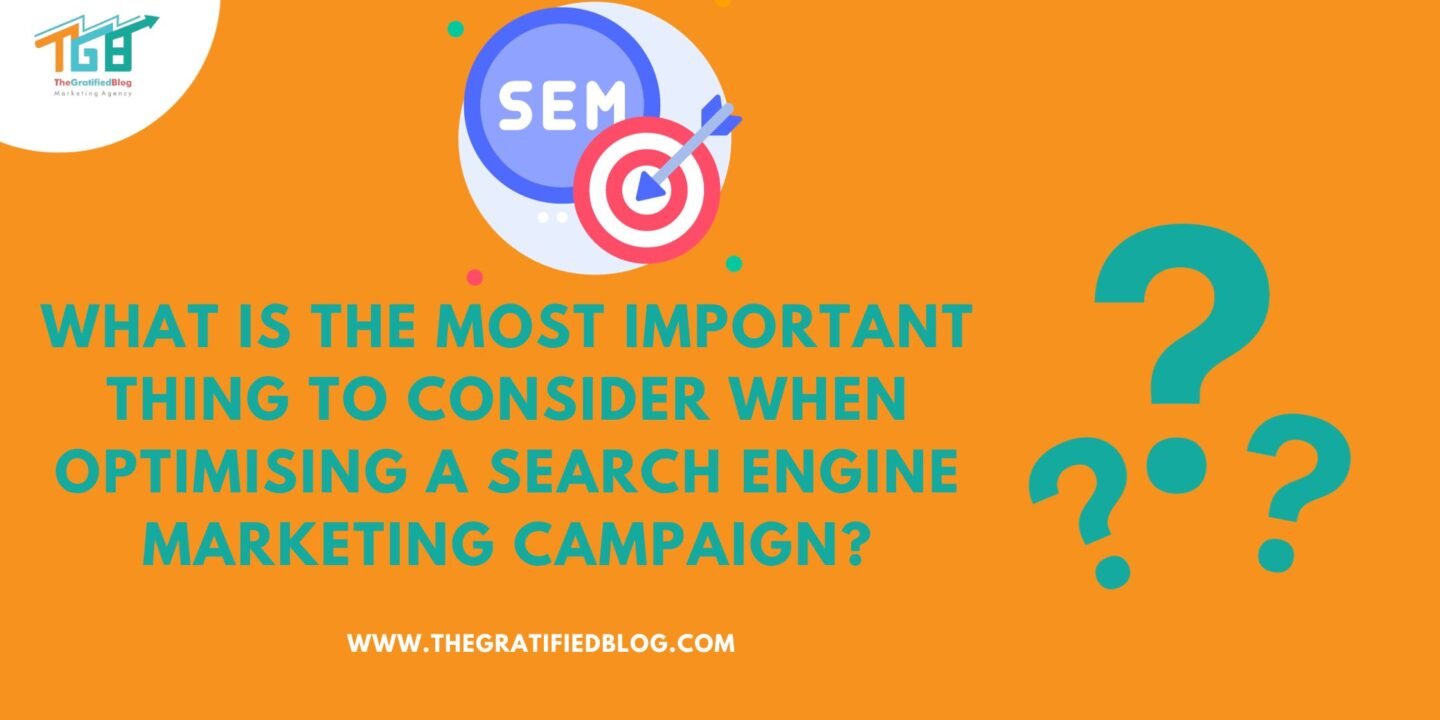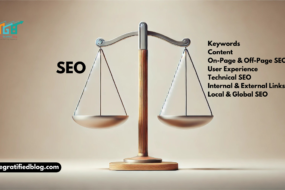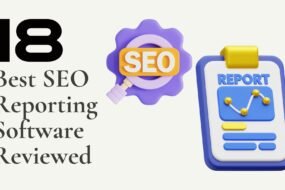
In this comprehensive guide, we will delve into the heart of SEM optimization and uncover: What Is The Most Important Thing To Consider When Optimising A Search Engine Marketing Campaign?
In the ever-evolving world of digital marketing, optimizing a Search Engine Marketing (SEM) campaign is crucial for businesses aiming to harness the power of search engines like Google, Bing, and Yahoo. SEM campaigns, often synonymous with pay-per-click (PPC) advertising, offer a direct avenue to reach potential customers actively searching for products or services.
However, with numerous moving parts and constant changes in algorithms, it can be challenging to determine what matters most when optimizing an SEM campaign.
The most important thing to consider when optimizing a search engine marketing (SEM) campaign is relevance. Relevance ensures that your ads, keywords, landing pages, and targeting align closely with the needs and intentions of your target audience. When your campaign is highly relevant, it tends to perform better in terms of click-through rates, conversions, and overall ROI.
What Is SEM Optimization?

Before we dive into the core factor, let’s briefly recap what SEM optimization entails. SEM optimization is the process of fine-tuning various elements within your campaign to improve its efficiency, relevance, and performance. This involves meticulous planning, ongoing adjustments, and a keen eye for data and analytics. Some of the elements you’ll be working on include keywords, ad copy, landing pages, bidding strategies, and targeting options. While all these factors are vital, one overarching principle should serve as your North Star.
What Is The Most Important Thing To Consider When Optimising A Search Engine Marketing Campaign?
So, the key factor is relevance.
The most important thing to consider is enhancing the relevance of keywords, advertisements, and the landing page.
Some Other Important Factors To Consider
The most important thing to consider when optimizing an SEM campaign is relevance. At its core, SEM optimization is about aligning your campaign with the needs and intentions of your target audience. Relevance affects every facet of your campaign, from the keywords you choose to the landing pages you direct users to. Let’s break down why relevance reigns supreme:
Optimising Campaign Keywords and Ad Copy
- Keyword Relevance: Keywords are the foundation of any SEM campaign. Selecting the right keywords is more than just identifying high-volume terms; it’s about pinpointing keywords that resonate with your target audience. The more relevant your keywords are to your business and offerings, the more likely you are to attract genuinely interested users.
- Ad Copy Relevance: Your ad copy is your first interaction with potential customers. Crafting ad copy that directly addresses user intent and aligns with the chosen keywords is paramount. Users are more likely to click on ads that speak to their needs and expectations.
Landing Page Relevance
Once users click on your ad, they should land on a page that seamlessly extends the relevance of the ad. A well-optimized landing page provides the information users seek and facilitates their journey toward conversion, whether that’s making a purchase, signing up, or contacting your business.
Quality Score
Search engines like Google assign a Quality Score to your keywords based on their relevance to your ads and landing pages. A higher Quality Score can lead to better ad positions and lower costs. It underscores the importance of relevance in the eyes of search engines.
User Experience
Relevance goes beyond keywords and ad copy; it extends to the overall user experience. A campaign that aligns with user intent ensures a smoother, more satisfying experience for visitors. This, in turn, can lead to higher conversion rates and customer satisfaction.
Ad Extensions and Features
Even the use of ad extensions and additional features, such as location extensions or callout extensions, should enhance relevance. These extensions provide users with extra information that’s directly related to their needs.
Budget Efficiency
When your campaign is highly relevant, you’re less likely to waste your budget on clicks from users who aren’t genuinely interested. Your budget is allocated more efficiently, delivering a better return on investment (ROI).
Continuous Improvement
Relevance is not a static goal; it’s a dynamic one. By continuously monitoring and optimizing for relevance, you stay in tune with changing user behavior and market trends. Your campaign remains adaptable and competitive.
Benefits of Optimizing a Search Engine Marketing Campaign
Optimizing a Search Engine Marketing (SEM) campaign offers numerous benefits that can have a significant impact on the effectiveness and efficiency of your online advertising efforts.
Here are some key advantages:
- Improved ROI (Return on Investment): SEM optimization helps you get more value from your advertising budget. By refining your campaign, you can increase click-through rates, conversion rates, and overall performance, resulting in a higher return on investment.
- Better Targeting: Optimization allows you to fine-tune your audience targeting. You can focus on reaching the most relevant and high-intent users, reducing wasted ad spend on irrelevant clicks.
- Higher Click-Through Rates (CTR): Optimized ad campaigns typically result in higher CTRs. This means more people are clicking on your ads, increasing the likelihood of conversions.
- Increased Quality Score: Google AdWords and other advertising platforms use Quality Score to determine ad rank and cost per click. Optimizing your campaign can lead to a higher Quality Score, which can lower your overall advertising costs.
- Enhanced Ad Relevance: Optimizing your ads involves creating highly relevant ad copy and landing pages. This not only improves your Quality Score but also provides a better user experience, which can lead to higher conversion rates.
- A/B Testing: Optimization allows you to conduct A/B tests to determine which ad elements (such as headlines, images, or call-to-action buttons) perform best. This data-driven approach helps you make informed decisions to maximize ad performance.
- Budget Efficiency: By optimizing your campaign, you can allocate your budget more efficiently to top-performing keywords and ads. This ensures that you’re getting the most out of your available resources.
- Increased Conversions: Ultimately, the goal of SEM is to drive conversions, whether they are sales, sign-ups, or other desired actions. Optimization helps you identify and eliminate barriers to conversion, resulting in more successful outcomes.
Conclusion
In the intricate world of SEM optimization, relevance is the golden thread that ties everything together. It’s the guiding principle that ensures your campaign resonates with your audience, from the initial search query to the final conversion. By prioritizing relevance in your keyword selection, ad copy, landing pages, and overall user experience, you’re on the path to SEM success.
As you navigate the complex landscape of SEM, remember that relevance is not a one-time achievement but an ongoing pursuit. Regularly analyze data, conduct A/B tests, and stay attuned to your customers’ evolving needs. In doing so, you’ll not only optimize your SEM campaign but also build lasting connections with your audience, ultimately driving the results that matter most to your business.
FAQs
Q. What are some common mistakes to avoid when optimizing an SEM campaign?
Common mistakes to avoid include neglecting keyword research, ignoring negative keywords, not testing ad variations, and failing to optimize landing pages for conversions. Additionally, overlooking changes in the competitive landscape can be a pitfall.
Q. Why is relevance so important in SEM optimization?
Relevance is crucial because it directly impacts your ad’s Quality Score, which, in turn, affects your ad’s position, click-through rate, and cost per click. Highly relevant ads are more likely to rank well and cost less.
Q. What role do negative keywords play in SEM optimization?
Negative keywords are essential for excluding irrelevant search terms that could trigger your ads. By adding negative keywords, you can improve the quality of traffic to your site and reduce wasted ad spend.








No Comments